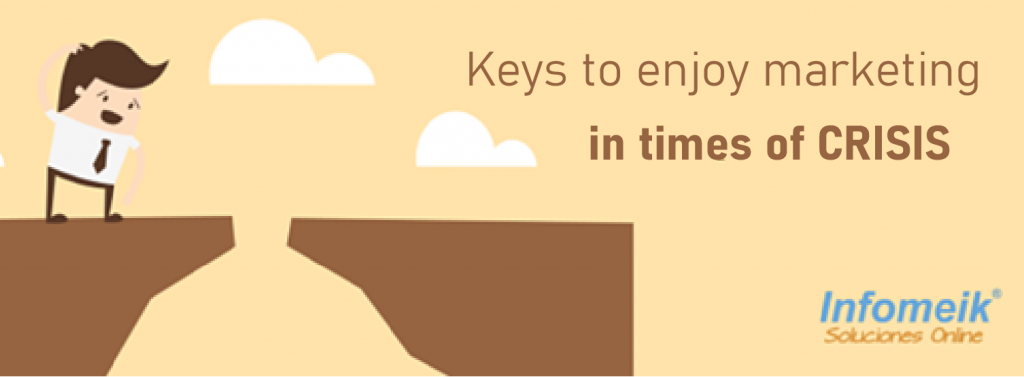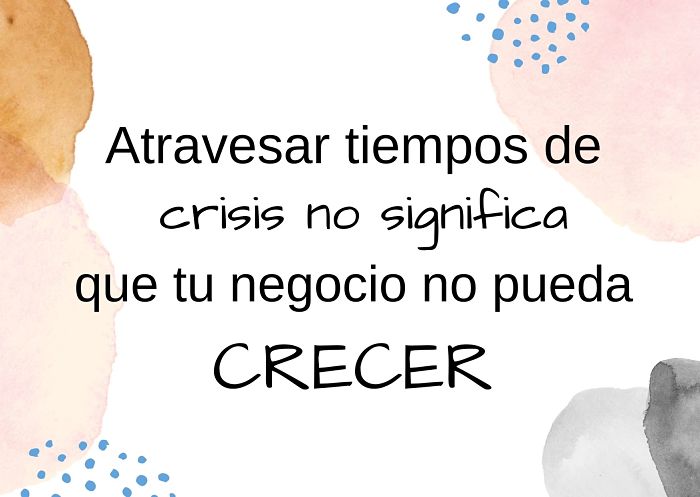
Have you noticed that big companies never stop marketing? No matter what happens, a percentage of their turnover will always be earmarked for marketing.
If there is a new scenario in which you have to sell your products and/or services change with it.
You must adapt to the new times Detect changes in the habits of your users and the market in general and reformulate your products and services to provide greater perceived value to your customers.
See which market sectors are working well and sell to them.
Develop new markets and sales channels. Detect new business opportunities.

Es muy probable que tu mercado se sature con un menor nivel de ventas. Piensa en nuevos segmentos donde colocar su excedente de producción. Reorganiza tus productos y tu cliente objetivo.
There are many customers out there waiting for someone to offer them your products and services.
That is why you must make these changes both in your company and in your way of thinking:
- Look at changing scenarios as an opportunity. In difficult times only those who stand out succeed, the others stay on the road. Don’t miss the opportunity to grow and outperform your competitors by using innovative, different marketing strategies, and the right technology. Decide what action to take in each channel to make your advertising effective.
- Get more results with less investment. Set yourself ambitious goals and optimize your advertising costs. To reach further, marketers need to create a strategy and increase its effectiveness. Set clear goals and use the optimal technology and tools. Counting on marketing professionals will help you achieve your objectives.
- Focus on your current clients. Winning new ones involves a lot of effort and you experience this every day. Although we won’t give up on getting new clients, we must take care of the old ones. Keeping the customers you have won with so much effort is easier than fighting in the market for new ones. Make your old customers loyal. Offer them innovative products and services. Offer your old customers added value. Make sure that when they receive offers from the competition they do not want to stop working with you.

- Don’t be tempted, don’t compete on price. Reinforce your corporate image and the quality of your products and services Be the best always. Provide greater value to the customer so that they choose your brand and not the sales. The 3×2 on your products will not work for you and will make you lose your reputation. Once you lower your price you can never raise it again and the market will have you listed as cheap. “Generate value and competitive advantages”, says Abram.
- Reconsider and be innovative. Don’t repeat the usual. Leave behind old habits and with a marketing specialist plan the actions that will give you results. Customers do not appreciate marketing offers that do not fit their specific needs, they want you to offer them what they need at that moment.
- Call your customers and listen to their needs. Make the most of the dialogue you establish. From experience, I know that whenever I go to visit a client, he asks me about his doubts, I explain to him how his strategy is, and, in addition to building his loyalty, he ends up hiring yet another service. Find out what your customer says, explicitly and implicitly, and use this information to offer them the most suitable product and/or services. What channels do you use to buy? When do you visit my website? Do you read my emails? Make him feel understood and valued.
- More than ever before, MKT! During a difficult period, it is important to maintain contact with consumers. Focus your advertising on the most profitable niches and invest ineffective tools. Digital marketing is the best option.
- Take advantage of “Good Practices”. Don’t make anything up, everything has already been tested, just keep an eye on the “Good Practices”. Check out the success stories of competitors and well-known brands and copy what they are doing well.

- New proactive communication. You must strengthen your relationship with your customers by maintaining sincere contact with them. The traditional communication systems (reactive), in the crisis, become obsolete, so you must implement proactive customer service systems.
- Combines online and offline channels. It creates a unique strategy that follows the same thread. It integrates all sales channels (online, catalog and direct mail shop, e-mail, mobile, web, kiosk, and telephone). Includes social media platforms such as YouTube or MySpace, reaching your customers on video is very important, they see you and your products brings you closer. Everyone in the company should be able to take advantage of the consumer data that has been obtained through all these channels
- The whole company with one goal. Everyone should have time to have meetings, to gather criteria, to collaborate on strategies, and to communicate it to the client.
- Prepare for the time after the crisis. Invest in such a way that your strategy can be effective and valid when everything returns to normal. With new emerging marketing and sales channels, you should be prepared to integrate them into a flexible structure.
- Follow and evaluate the digital revolution. It works with all social networks. Address your customers through their favorite channel and it is very likely that they will be willing to listen and respond to you. Interact with people, be resilient and empathetic. Help others in a selfless way whenever you can. Give advice and good practice.
- Cutting back, but not showing. We must avoid cutting costs that may affect buyer satisfaction and affect sales. Cut what the customer does not see. The customer must always feel that everything is the same.
- Relax and remember. Times, technologies, clients… everything changes and you must adapt in time.



 Español
Español


